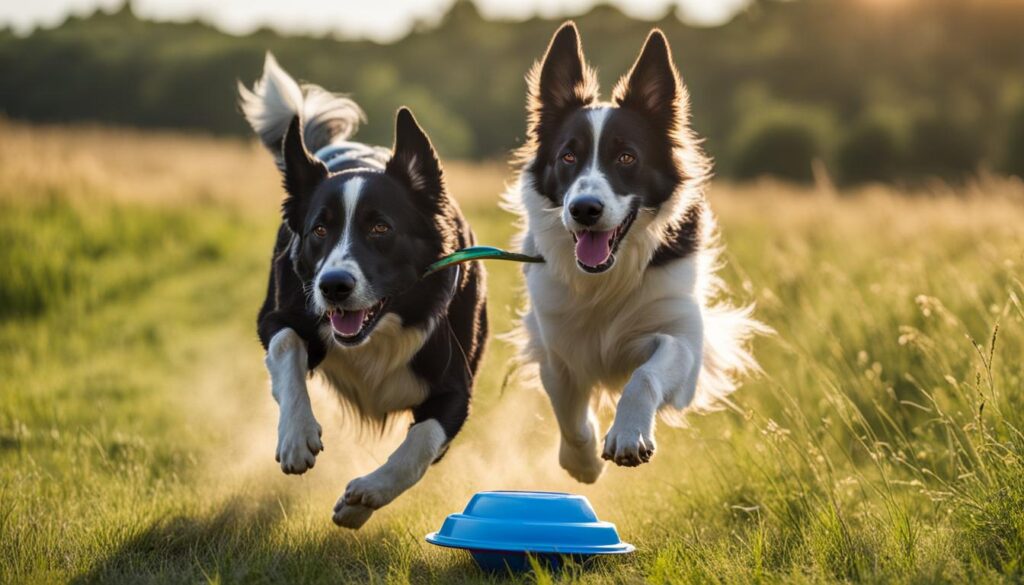Welcome to our comprehensive guide on managing obesity in dogs. In this article, we will provide you with valuable insights and strategies to help your furry friend achieve a healthy weight. By implementing proper nutrition, healthy weight loss strategies, and caloric restriction, you can support your dog’s overall well-being and reduce the risk of obesity-related health issues. Let’s dive in!
Key Takeaways:
- Proper nutrition is crucial for preventing and managing obesity in dogs.
- Healthy weight loss strategies and caloric restriction can help dogs achieve and maintain a healthy weight.
- Obesity in dogs increases the risk of various health issues such as diabetes, heart disease, and joint problems.
- A balanced diet, portion control, exercise, and behavioral enrichment are essential components of managing canine obesity.
- Consulting with veterinary professionals, including veterinary nutritionists, is important for personalized guidance and support.
Understanding the Causes and Risks of Canine Obesity
Obesity in dogs is a common problem that can have serious health implications. As a responsible pet owner, it is crucial to understand the causes and risks associated with canine obesity in order to prevent and manage this condition effectively.
One of the key causes of obesity in dogs is overfeeding. Providing excessive amounts of food or feeding high-calorie diets can lead to weight gain over time. Additionally, genetic predisposition, lack of exercise, age, and certain medical conditions can also contribute to obesity in dogs.
It is important to recognize the health risks associated with obesity in dogs. Overweight dogs are at a higher risk of developing conditions such as diabetes, heart disease, joint problems, respiratory issues, and a reduced lifespan. By addressing the causes of obesity and implementing appropriate strategies, pet owners can help their dogs avoid these potential health complications.
“Obesity is not only a cosmetic issue in dogs, but it also has serious health consequences. Maintaining a healthy weight is essential for their overall well-being and longevity.”
– Dr. Michelle Lopez, Veterinary Nutritionist
To address the issue of obesity in dogs, it is important to focus on prevention. By providing a balanced diet and ensuring that dogs receive regular exercise, pet owners can help maintain a healthy weight for their furry companions. Consulting with veterinary professionals, such as veterinary nutritionists, can provide valuable guidance in developing suitable diet plans and exercise routines tailored to the specific needs of each individual dog.
| Risks of Canine Obesity | Prevention Strategies |
|---|---|
| Diabetes | Provide a balanced diet with appropriate portion control |
| Heart disease | Incorporate regular exercise into daily routines |
| Joint problems | Consult with veterinary professionals for personalized diet and exercise plans |
| Reduced lifespan | Monitor food intake and avoid excessive treats or table scraps |
| Respiratory issues | Engage in regular physical activities to promote weight loss |
By understanding the causes and risks of canine obesity, pet owners can take proactive steps to prevent and manage this condition. Making informed decisions about nutrition and exercise will not only help dogs maintain a healthy weight but also improve their overall quality of life.
Balancing Calories and Exercise: Nutritional Counseling for Obese Dogs
When it comes to managing obesity in dogs, a crucial aspect is conducting a thorough nutritional assessment. This assessment helps determine the individualized needs of the dog, taking into account factors such as age, physiological status, activity level, and feeding management. By balancing calories through diet and exercise, pet owners can play an active role in helping their dogs achieve a healthy weight.
A key component of the nutritional assessment is evaluating the body condition score (BCS) and muscle condition score (MCS) of the dog. The BCS measures the amount of body fat, while the MCS assesses the muscle mass. These assessments provide valuable insights into the dog’s current state and guide the development of a customized nutritional plan.
Once the nutritional assessment is complete, a balanced diet can be implemented to support weight management in obese dogs. This includes providing high-quality, low-calorie dog food that meets their nutritional requirements while promoting weight loss. Portion control is essential to prevent overfeeding, and pet owners must ensure they properly measure and regulate food intake.

Table: Sample Daily Meal Plan for an Overweight Dog
| Meal | Feeding Amount |
|---|---|
| Morning | 1 cup of low-fat dry dog food |
| Afternoon | 1/2 cup of steamed lean chicken and vegetables |
| Evening | 1 cup of low-fat dry dog food |
In addition to selecting the right food, portion control is crucial. It’s important to measure and regulate your dog’s food intake to avoid overfeeding. Follow the feeding guidelines provided by the food manufacturer and consult with your veterinarian to determine the appropriate portion sizes for your dog’s specific needs.
Remember, every dog is unique, and their dietary requirements may vary. It’s always best to consult with your veterinarian before implementing any new diet or weight loss plan for your overweight dog. They can provide personalized guidance based on your dog’s age, breed, activity level, and overall health.
Exercise and Diet in Canine Weight Management
Exercise is a crucial component of managing obesity in dogs. Regular physical activity helps dogs burn calories, maintain a healthy weight, and improve their overall well-being. By incorporating exercise into your dog’s daily routine, you can promote weight loss and reduce the risk of obesity-related health issues.
There are various ways to engage your dog in exercise and promote an active lifestyle. Taking your dog for daily walks not only provides physical activity but also mental stimulation. Playtime with interactive toys or engaging in games such as fetch can help keep your dog active and entertained. Additionally, participating in agility training or obedience classes can provide structured exercise for your dog while strengthening the bond between you.
Remember to consult with your veterinarian before starting any new exercise routine, especially if your dog has underlying health conditions or is not accustomed to regular physical activity.
Alongside exercise, a balanced diet plays a vital role in canine weight management. It’s important to provide your dog with high-quality, low-calorie dog food that meets their nutritional needs. Portion control is key to avoid overfeeding and ensure your dog is consuming the appropriate amount of calories for weight loss or maintenance. Avoid excessive treats and opt for healthier alternatives to manage calorie intake effectively.
When it comes to dietary restrictions and choosing the right food for your dog, consulting with a veterinary professional or a veterinary nutritionist can provide valuable insights and guidance. They can help develop a customized diet plan that aligns with your dog’s specific needs, including any medical conditions or dietary restrictions.
Benefits of Exercise in Canine Weight Management:
- Helps burn calories and promote weight loss
- Improves cardiovascular health and overall fitness
- Strengthens muscles and enhances mobility
- Reduces the risk of obesity-related health issues
- Provides mental stimulation and reduces behavioral issues
Examples of Canine Exercises:
- Daily walks or hikes
- Playtime with interactive toys
- Fetch or Frisbee games
- Agility training
- Obedience classes

| Dietary Recommendations | Benefits |
|---|---|
| Provide high-quality, low-calorie dog food | Aids in weight loss and maintains nutritional needs |
| Avoid excessive treats | Prevents calorie overload and supports weight management |
| Consult with a veterinary professional or nutritionist | Expert guidance for tailored dietary plans |
By combining regular exercise with a balanced diet, you can effectively manage your dog’s weight and improve their overall health. Remember to monitor your dog’s progress and make adjustments to their exercise routine and diet as needed. With proper care and attention, you can help your dog achieve and maintain a healthy weight for a happy and active life.
Nutritional Strategies in Veterinary Practice
When it comes to managing obesity in dogs, partnering with veterinary professionals is essential. Veterinarians play a crucial role in guiding pet owners through the process of developing effective nutritional strategies for their overweight dogs. With their expertise in veterinary medicine and nutrition, they can provide valuable insights and recommendations tailored to the individual needs of each dog.
Veterinary nutritionists are specialists who focus on formulating balanced diet plans for dogs. They have in-depth knowledge of the nutritional requirements of different breeds and can help design customized meal plans that promote weight loss while ensuring essential nutrients are met. Collaborating with a veterinary nutritionist can provide pet owners with peace of mind, knowing that their dog’s dietary needs are being properly addressed.
In addition to offering nutritional counseling and diet planning, veterinary professionals can also monitor the progress of a dog’s weight loss journey. Regular check-ups and follow-ups allow veterinarians to assess the effectiveness of the chosen nutritional strategies and make any necessary adjustments.

Benefits of Partnering with Veterinary Professionals
- Expert guidance: Veterinary professionals have the knowledge and expertise to develop effective and safe nutritional strategies for managing obesity in dogs.
- Customized approach: By assessing each dog’s specific needs and considering factors such as age, breed, and overall health, veterinary professionals can create individualized diet plans.
- Monitoring and support: Regular check-ups and follow-ups with veterinarians allow for ongoing monitoring of a dog’s progress and provide support throughout their weight loss journey.
- Access to veterinary nutritionists: Collaborating with veterinary nutritionists ensures that dogs receive the best possible diet plan, tailored to their unique nutritional requirements.
By partnering with veterinary professionals and availing their expertise, pet owners can optimize their efforts in managing obesity in dogs. Veterinary professionals can provide the necessary guidance, support, and monitoring to help dogs achieve and maintain a healthy weight, improving their overall well-being and quality of life.
Conclusion
As a responsible pet owner, managing the obesity of your beloved canine companion is crucial for their overall well-being and longevity. By understanding the causes and risks of canine obesity, you can take proactive steps to prevent and manage this condition.
Implementing a balanced diet is key to combating obesity in dogs. Providing high-quality, low-calorie dog food and practicing portion control can help your furry friend achieve and maintain a healthy weight. Consider consulting with a veterinary professional to develop a customized diet plan that meets your dog’s nutritional requirements while promoting weight loss.
In addition to a healthy diet, regular exercise is essential for your dog’s weight management. Engage them in daily physical activities, such as brisk walks, playtime, and interactive games. Not only will exercise help burn calories, but it will also stimulate your dog mentally, reducing behavioral issues.
Remember to collaborate with veterinary professionals throughout your dog’s weight management journey. They can provide valuable nutritional counseling, monitor your dog’s progress, and offer expert guidance. Together, you can ensure that your furry friend stays fit and healthy.
FAQ
What causes obesity in dogs?
Obesity in dogs can be caused by factors such as overfeeding, genetic predisposition, lack of exercise, age, and medical conditions.
Why is managing obesity important for dogs?
Managing obesity in dogs is important to prevent health issues like diabetes, heart disease, joint problems, reduced lifespan, and respiratory issues.
How do you assess obesity in dogs?
Obesity in dogs can be assessed by evaluating body condition score (BCS) and muscle condition score (MCS), which help determine an individualized nutritional plan.
What should a balanced diet for obese dogs include?
A balanced diet for obese dogs should include high-quality, low-calorie dog food, limited treats, portion control, and possibly low-fat diets for weight loss.
How important is exercise for managing obesity in dogs?
Regular exercise is vital for managing obesity in dogs as it helps burn calories, maintain a healthy weight, stimulate dogs mentally, and reduce behavioral issues.
How can veterinary professionals help in managing obesity in dogs?
Veterinary professionals can provide nutritional counseling, develop customized diet plans, and monitor progress in managing obesity in dogs.
Source Links
- https://www.purinainstitute.com/sites/default/files/2022-10/Obesity-in-Pets_Nutritiona-and-Behavioral-Strategies-for-Preventing-and-Managing-Excess-Weight_Monograph.pdf
- https://furballstory.com/blogs/dog-health/tackling-dog-obesity-a-guide-to-weight-management
- https://www.aaha.org/globalassets/02-guidelines/2021-nutrition-and-weight-management/resourcepdfs/new-2021-aaha-nutrition-and-weight-management-guidelines-with-ref.pdf





